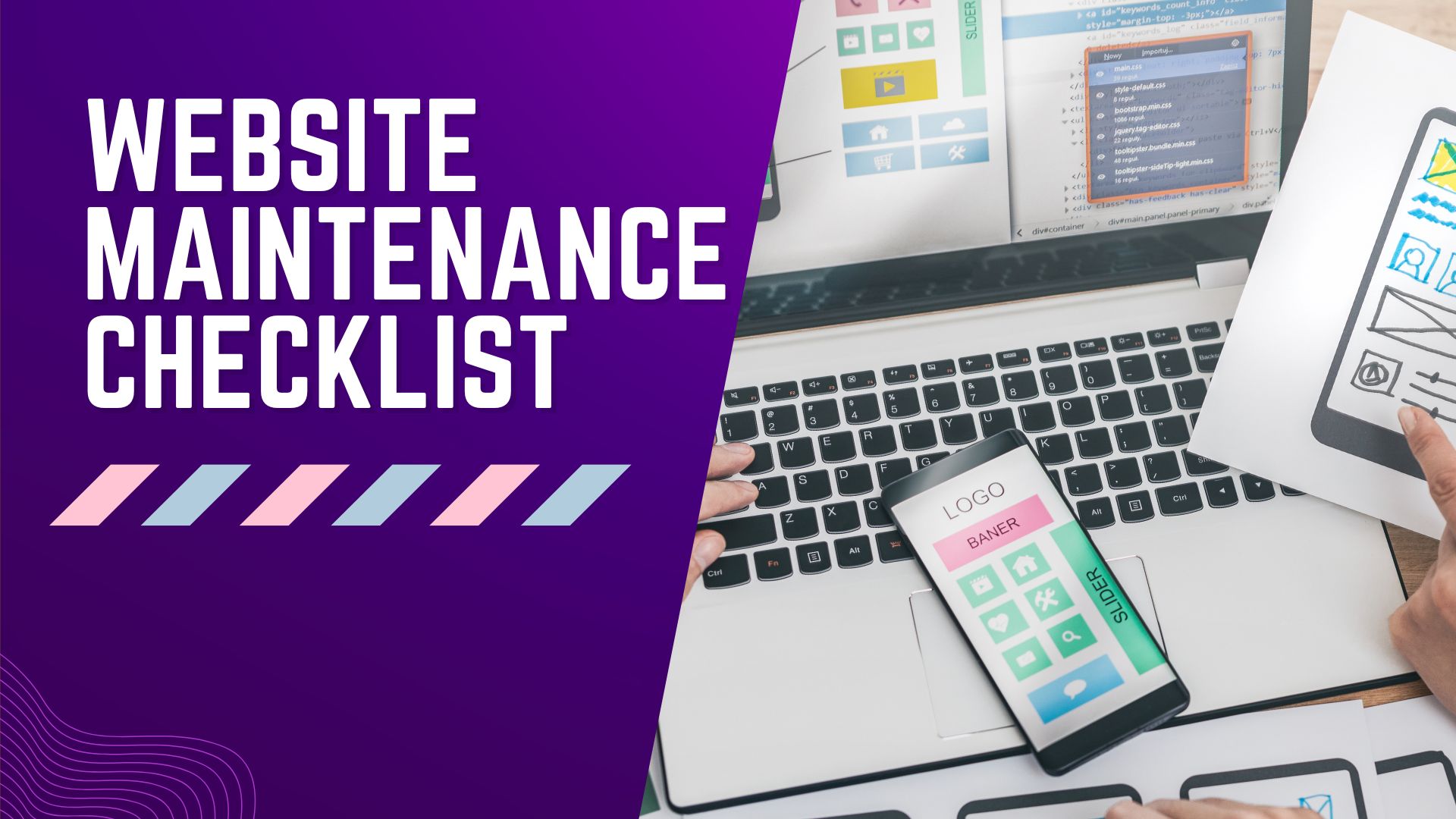Website maintenance checklist ensures that your website is up-to-date, secure, and running smoothly. Regularly performing tasks such as updating plugins, checking for broken links, optimizing performance, and backing up your website are essential for its overall health and functionality.
A well-maintained website not only provides a better user experience but also helps in improving search engine rankings. Neglecting website maintenance can lead to security vulnerabilities, slow loading times, and potential loss of traffic. By following a comprehensive website maintenance checklist, you can ensure that your website remains at its best, benefiting both your users and your business.
We will explore the essential tasks to include in your website maintenance checklist to keep your website in top condition.

Credit: www.lightspeedhq.com
The Importance Of Website Maintenance
Regular website maintenance is crucial for the success of your online presence. Through consistent updates and optimizations, you ensure that your website remains safe, performs efficiently, and provides an outstanding user experience. Neglecting website maintenance can lead to security vulnerabilities, sluggish performance, and a decline in search engine rankings. To avoid these setbacks, it’s important to follow a comprehensive website maintenance checklist that covers security measures, performance optimization, and more.
Website security is a paramount concern in today’s digital landscape. With increasing cyber threats and frequent hacking attempts, it’s essential to implement robust security measures to protect your website and its users. By regularly updating your website’s plugins, themes, and content management system, you mitigate the risk of security breaches that could compromise sensitive data, such as customer information and financial transactions. Furthermore, employing strong passwords, implementing measures to prevent brute force attacks, and regularly backing up your website are vital for safeguarding against potential threats.
A fast and responsive website is critical for user satisfaction and engagement. Performance optimization involves various strategies aimed at enhancing the speed and efficiency of your website. Compressing images, minifying CSS and JavaScript files, and enabling caching are some effective techniques to minimize page loading times. Implementing a content delivery network (CDN) can distribute website resources globally, improving server response times for your audience worldwide. Regularly monitoring website performance, identifying and fixing broken links, and optimizing the website’s code are essential to ensure seamless navigation and optimal user experience.
Key Areas Of Website Maintenance
When it comes to maintaining a website, there are key areas that require regular attention to ensure optimal performance, security, and functionality. By focusing on these essential aspects, website owners can ensure that their sites remain up-to-date and effectively serve their intended purpose. Let’s delve into the critical areas of website maintenance that should be part of your regular checklist.
Content Updates
Updating content is crucial for keeping a website relevant and engaging for visitors. Regular content updates not only provide fresh information but also contribute to improved search engine rankings. Whether it’s adding new blog posts, updating product descriptions, or refreshing images, consistently adding valuable content keeps the website current and maintains visitor interest.
Software Updates
Keeping software components such as content management systems, plugins, and themes updated is vital for website security and performance. Outdated software can leave vulnerabilities that hackers can exploit, putting the website at risk. Regularly installing software updates ensures that the website remains secure and functions optimally, providing a seamless user experience.
Backup Procedures
Establishing a reliable backup system is essential for protecting the website’s data. Regular backups safeguard against data loss in the event of server issues, hacking attempts, or other unforeseen events. Implementing a scheduled backup procedure, whether through a web host or a third-party service, provides peace of mind and the ability to restore the website quickly in case of any mishap.
Tools And Resources For Effective Maintenance
When it comes to maintaining a website, having the right tools and resources in place is crucial for effective management. By utilizing these tools and resources, website owners can ensure that their site remains secure, up-to-date, and efficient. Let’s explore the key tools and resources that are essential for effective website maintenance.
Content Management Systems
Content Management Systems, commonly referred to as CMS, are essential tools for managing website content. Platforms like WordPress, Joomla, and Drupal provide user-friendly interfaces that allow for easy content updates and management. With a CMS, website owners can efficiently organize, edit, and publish content without requiring in-depth technical knowledge.
Security Plugins
Security is a top priority when it comes to website maintenance. Security plugins play a critical role in safeguarding websites from malicious attacks and unauthorized access. Plugins like Wordfence, Sucuri, and iThemes Security provide features such as firewall protection, malware scanning, and login security, helping to enhance the overall security posture of the website.
Common Website Maintenance Mistakes To Avoid
Website maintenance is a key aspect of keeping your site running smoothly and effectively. However, there are several common mistakes that website owners often make that can hinder their website’s performance and security. In this article, we will discuss two crucial website maintenance mistakes that you should avoid at all costs. By addressing these issues, you can ensure that your website is functioning optimally and providing the best user experience for your visitors.
Neglecting Security Updates
One of the most significant mistakes website owners make is neglecting to update their website’s security regularly. Security vulnerabilities can leave your website exposed to cyberattacks and compromise your valuable data, including sensitive user information. It’s crucial to stay up to date with the latest security patches and updates for your website’s content management system (CMS), plugins, themes, and any other installed software.
When security updates become available, it’s essential to apply them promptly to protect your website from potential threats. Ignoring these updates can leave your website susceptible to unauthorized access, data breaches, or even malware infections. Regularly updating your website’s security measures keeps your site protected and ensures a secure online experience for your visitors.
Ignoring Mobile Responsiveness
With the increasing use of mobile devices to access websites, ignoring mobile responsiveness is a significant mistake that can negatively impact your website’s user experience and search engine rankings. A mobile-responsive website automatically adjusts its layout and design to fit different screen sizes, making it easily accessible and visually pleasing on smartphones and tablets.
Without mobile responsiveness, your website may appear distorted or unreadable on mobile devices, resulting in a poor user experience. Visitors may quickly leave your site and turn to your competitors for a better mobile experience. Additionally, search engines like Google prioritize mobile-friendly websites in their search results, so ignoring mobile responsiveness can harm your website’s visibility and organic traffic.
Ensuring that your website is mobile-responsive involves using responsive website templates or themes and testing your site on various devices and screen sizes. By prioritizing mobile responsiveness, you can provide a seamless and user-friendly experience for your visitors, regardless of the device they are using to access your website.
Creating A Website Maintenance Schedule
Maintaining a website is crucial for its optimal performance. By creating a website maintenance schedule and following a comprehensive checklist, you can ensure that your site stays secure, up-to-date, and user-friendly.
Creating a website maintenance schedule is essential to ensure that your website always stays updated, secure, and relevant. By implementing a schedule, you can stay on top of regular tasks that help optimize and improve your website’s performance. A well-maintained website not only enhances the user experience but also improves your search engine rankings. In this post, we will explore three key areas that should be included in your website maintenance schedule: regular content audits, monthly security checks, and routine backup strategies.
Regular Content Audit
Keeping your website content fresh and up-to-date is crucial for engaging users and maintaining search engine visibility. Conducting regular content audits should be a part of your website maintenance schedule. During a content audit, you can: 1. Identify outdated or irrelevant content and remove it from your website. 2. Make sure all pages have accurate and up-to-date information, including contact details, product descriptions, and pricing. 3. Check for broken links and fix them promptly, as broken links can negatively impact user experience and SEO. 4. Analyze your website’s analytics data to identify top-performing content and optimize it further. 5. Identify gaps in your content strategy and create new content to address those gaps. By regularly auditing your website’s content, you can ensure that your visitors are accessing the most relevant information, improving the overall user experience.
Monthly Security Checks
Protecting your website and its visitors from security threats is crucial in today’s online landscape. Implementing monthly security checks in your website maintenance schedule is vital to minimize the risk of potential breaches and vulnerabilities. As part of your monthly security checks, consider: 1. Updating your website’s software, including content management systems, plugins, and themes, to the latest versions. 2. Scanning your website for malware or suspicious files using security plugins or online tools. 3. Checking for any unusual or unauthorized activity in your website’s server logs. 4. Verifying the integrity of your website’s SSL certificate, ensuring secure communication with visitors. 5. Reviewing user access privileges and removing any unnecessary or outdated user accounts. By regularly monitoring and addressing security vulnerabilities, you can protect your website and the sensitive information of your users.
Routine Backup Strategies
Having a backup strategy in place is essential as it ensures that you have a copy of your website’s important data in case of any unforeseen events or emergencies. Including routine backups in your website maintenance schedule provides peace of mind and minimizes potential losses. Consider the following backup strategies: 1. Schedule regular automated backups of your website’s files and databases. 2. Store backups in separate locations, such as cloud storage or offline backups, to prevent data loss. 3. Test the restoration process periodically to ensure backups are functioning correctly. 4. Keep multiple versions of backups, allowing you to recover from different points in time if needed. 5. Regularly update your backup strategy to align with any changes in your website’s structure or content. Having a reliable backup ensures that you can quickly restore your website’s functionality in case of accidental data loss, hacking attempts, or server failures. Implementing a website maintenance schedule that includes regular content audits, monthly security checks, and routine backup strategies is crucial to the success and longevity of your website. By allocating time and resources to these essential tasks, you can enhance user experience, improve search engine rankings, and safeguard your website from potential threats. So, make creating a website maintenance schedule a priority and enjoy the benefits of a well-maintained website.

Credit: getjobber.com
)
Credit: www.teamwork.com
Frequently Asked Questions Of Website Maintenance Checklist
Why Is Website Maintenance Important?
Website maintenance is crucial for ensuring a smooth and secure online experience for your visitors. Regular updates and monitoring help prevent security breaches, maintain website functionality, improve user experience, and optimize performance for better search engine rankings.
What Does Website Maintenance Include?
Website maintenance encompasses several aspects such as content updates, security monitoring, software and plugin updates, regular backups, performance optimization, fixing broken links, and ensuring mobile responsiveness. This holistic approach ensures your website remains secure, up-to-date, user-friendly, and performs at its best.
How Often Should I Perform Website Maintenance?
Website maintenance should be performed regularly to keep your website running smoothly. Depending on your website’s complexity, updates and checks should ideally be done weekly or monthly. However, critical tasks like security updates and backups should be done more frequently to proactively protect your website and its data.
What Are The Benefits Of Regular Website Backups?
Regular website backups are essential to safeguard your data and protect against potential loss or security breaches. Backups ensure that in case of any errors or emergencies, you have a recent copy of your website’s content and database, allowing for quick restoration and minimizing downtime.
Conclusion
In a constantly evolving digital landscape, ensuring regular website maintenance is crucial for optimizing performance and user experience. By following a comprehensive website maintenance checklist, you can effectively address issues related to functionality, security, and content updates. By staying proactive and consistent with your website maintenance efforts, you can enhance your search engine visibility, improve user engagement, and ultimately achieve your business goals.
Embracing a strategic approach to website maintenance will not only keep your website running smoothly but also contribute to its long-term success.

Olga L. Weaver is a distinguished figure in both the realms of real estate and business, embodying a unique blend of expertise in these interconnected domains. With a comprehensive background in real estate development and a strategic understanding of business operations, Olga L. Weaver has positioned herself as a trusted advisor in the complex intersection of property and commerce. Her career is marked by successful ventures in real estate, coupled with a keen ability to integrate sound business principles into property investments. Whether navigating the intricacies of commercial transactions, optimizing property portfolios, or providing strategic insights into market trends, Olga L. Weaver’s expertise encompasses a wide spectrum of both real estate and business-related topics. As a dual expert in real estate and business, she stands as a guiding force, empowering individuals and organizations with the knowledge and strategies needed to thrive in these intertwined landscapes. Olga L. Weaver’s contributions continue to shape the dialogue around the synergy between real estate and business, making her a respected authority in both fields.


